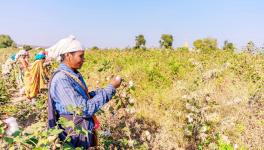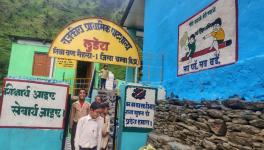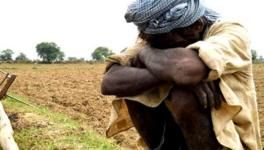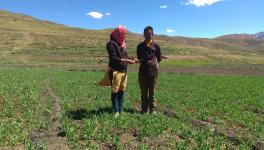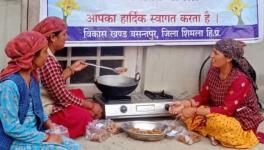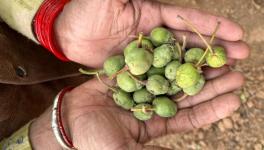Himachal: Rains in Lahaul-Spiti Wash Away roads, Farmers Unable to Take Crops to Market
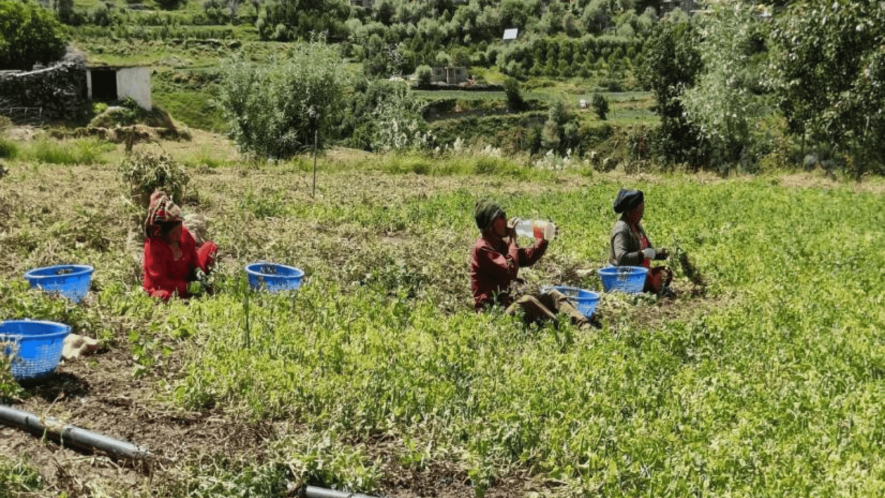
Mandi: The crops were ready, and plans were made. Like every year, farmers from the remote Himalayan region of Lahaul-Spiti in Himachal Pradesh were preparing to sell their crops at the local mandis, from where they would be transported to Delhi, Chandigarh and other parts of north India.
According to the President of the Fruit Vegetable and Flower Producers Association, Harish Chauhan, Lahaul's peas are quite in demand in cities like Chandigarh and New Delhi.
"They are of notable importance as they enter the market precisely when the supply from the other regions dwindles… they are known for their sweet flavour and extended shelf life comparatively…"
But the relentless downpour in the state in July washed away their plans, quite literally. The rains damaged key roads, making it difficult to transport the harvested crops, compelling farmers to discard the ripened produce. According to India Meteorological Department, Lahaul Spiti received 112.2 mm of rainfall on the night of July 9, which is close to the average rainfall the region receives during the whole month. Before this, Lahaul Spiti recorded 73mm of rain in a single day back in 1951.
The economy of Lahual-Spiti is primarily reliant on farming despite the challenging agricultural conditions. The farmers in the district only manage to cultivate one crop per season since the region is covered in snow for almost six months. Many families survive on the earnings of this one crop and focus on cash crops like potatoes, peas, cabbage, and exotic vegetables like lettuce, red cabbage, zucchini and broccoli.
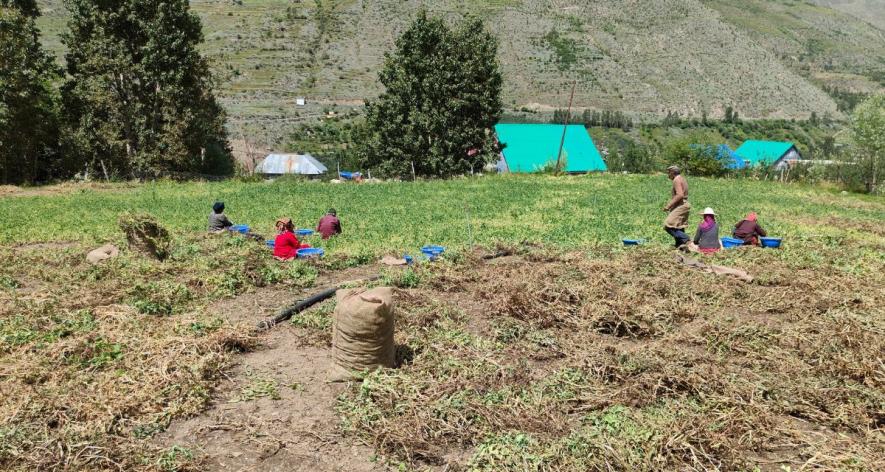
Farmers working in the fields midday (Photo - Raman Kant, 101Reporters)
In certain regions, farmers engage in a dual-cropping practice within a single season. They initiate cultivation of the first crop, including lettuce, cauliflower, parsley, cabbage, and peas, during early March, with harvesting taking place in July. Subsequently, they proceed to cultivate similar crops once more, achieving a subsequent harvest towards early October.
In Lahaul Spiti, farmers commence cultivation in March, and harvest kicks off in the initial week of July. Typically, farmers are spared the need to visit the mandi (market) to sell their yields. Instead, intermediaries known as adhtiyas, equipped with their vehicles, gather and load vegetables from designated collection points near the fields. Subsequently, they sell the produce in markets within Himachal Pradesh and beyond, continuing this practice from July through October.
However, this year, adverse weather conditions and road closures have hindered adhtiyas from reaching Lahaul, disrupting this established process, says retired agriculture department official Rajender Thakur.
Param Singh, a farmer from Pattan Valley, says, "With the roads closed, peas, which do not have a long shelf life, rotted as we waited. The excess moisture in the air sped up the process. I have lost Rs 1-1.5 lakh approximately."
Sudarshan Jaspa, the President of the Lahaul Spiti Potato Society, highlights the dire state of roads in the district due to the recent natural calamity. Particularly, villages such as Rashil, Jahalma, Nalda, Jobrang, and Madgran have experienced a heightened impact, he says.
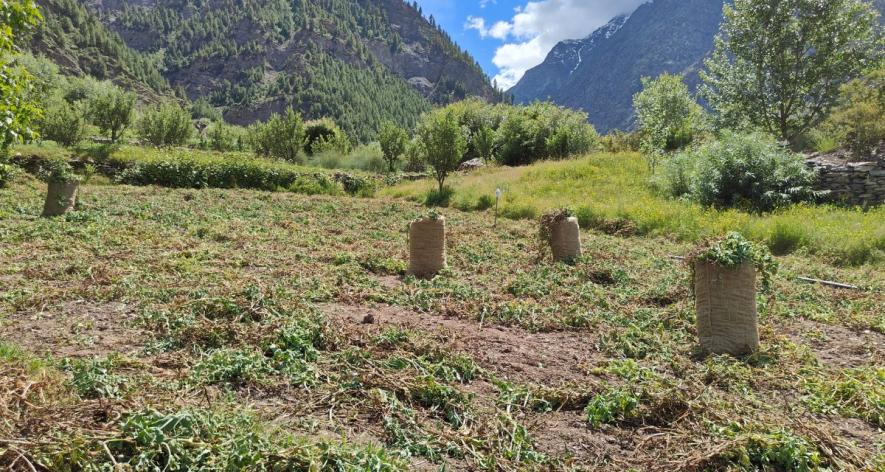
Sacks of produce on the field (Photo - Raman Kant, 101Reporters)
"The connectivity of numerous villages has been entirely severed from the primary road network. In instances where farmers manage to transport their crops to the main road, the middlemen have significantly reduced the prices offered for their produce," he adds.
Jaspa says, "I have conducted a price comparison for peas in Delhi, where the cost/kilogram has surged to Rs 130. In contrast, despite possessing superior quality peas, local farmers are receiving a mere Rs 30/kilogram. This has further exacerbated the challenges faced by the farmers during this time of adversity."
Take Motilal of Madgran village, for example. His family of four is solely dependent on agriculture for livelihood.
"I can only take the crop to market once a year, and I cannot do so this year. Large vehicles are no longer plying; only smaller vehicles are able to make it. Usually, I would have earned around Rs 2-3 lakh from peas, but this year I feel my earnings will drop at least two-thirds. I am worried about my family…" he says.
The farmers have conveyed their apprehensions regarding the damages to the local authorities; however, the likelihood of them receiving compensation appears slim, given the current state of disaster and the challenging economic circumstances faced by the state. Furthermore, the Fasal Bima Yojana does not encompass provisions for compensation in such scenarios. Its scope is limited to instances of crop loss or failure occurring solely within the farmer's own field, says Sham Aazd, a farmer.
Farmers have had to assume the responsibility of unblocking roads, with Inderjit Singh Bhanu of Rashil village saying that the community collaborated to clear pathways.
"Nevertheless, the closure of the primary Kullu-Manali route has presented obstacles to vegetable sales. Formerly, farmers would market their harvest in Kullu-Manali's markets, yet, this season, the closure of local markets spanning the distance from Kullu to Mandi district has forced farmers to confront the challenge of marketing their crops," he told 101Reporters in early August.
As per the State Disaster Management report released earlier this month, the Public Works Department has incurred a substantial loss of approximately Rs 1900 crore, while the Agriculture Department has faced losses totalling Rs 158 crore. Currently, over 293 roads remain impassable throughout the state.
BC Negi, the Executive Engineer of the Public Works Department, said a majority of roads had been successfully reopened by the first week of August.
"The department has incurred losses of approximately Rs 20 crore due to the combined impact of heavy rainfall and landslides. A bridge situated in the Sissu area of the district has been left inoperable, necessitating ongoing preparations for the installation of a suspension bridge as a viable substitute...," he adds.
(Raman Kant is a Himachal Pradesh-based freelance journalist and a member of 101Reporters, a pan-India network of grassroots reporters)
Get the latest reports & analysis with people's perspective on Protests, movements & deep analytical videos, discussions of the current affairs in your Telegram app. Subscribe to NewsClick's Telegram channel & get Real-Time updates on stories, as they get published on our website.









